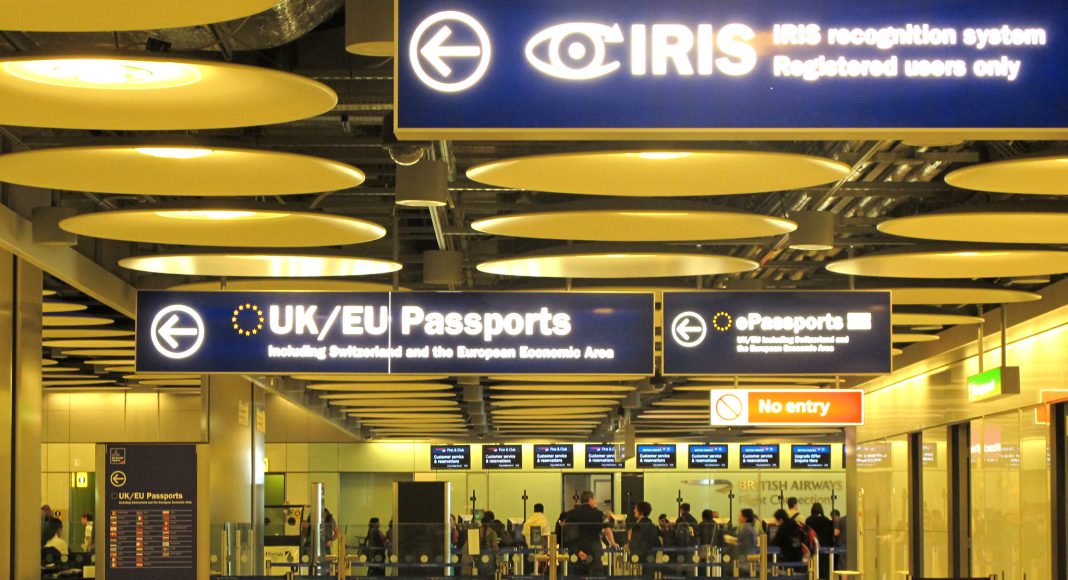On 1 July I was detained for the second time consecutively by British ‘counter-terror’ police at Manchester Airport, using Schedule 7 of the Terrorism Act 2000, which strips detainees of the right to ‘no comment’. It is clear that this and other measures by the British state constitute harassment and blacklisting of pro-Palestine activists. At a time when charges of ‘terrorism’ are being extended to ever-widening circles of those who resist British support for Zionism, these moves must be fought by all progressive forces.
Schedule 7 applies only at Britain’s borders, giving the police powers to opportunistically detain – they insist that this is not an arrest – without stating any reason or evidence of lawbreaking. Detainees have no right to silence or a lawyer present, though they are able to consult via phone; solicitors say these calls are routinely listened in on by the police.
My previous detention in summer 2024 came as I returned to Manchester from Ireland. An organised squad met me on the tarmac as I exited the plane and drove me to a secure location in the airport. I had expected them. Zionist Twitter trolls reported to police a speech given on a demonstration, demanding an arrest. FRFI comrades, among others had been arrested for ‘terrorism’ in similar circumstances.
During this 2024 detention, I was asked insulting and totally unsubstantiated questions about Palestinian friends and activist groups: Who did I know in Gaza and Lebanon? Did I send them money? What was I involved in in Britain? And what were my views on everything from British politicians to the Palestinian resistance operations of 7 October 2023? I would encourage others in the same situation to think creatively about their answers.
The second time around, the anti-terror cops seemed like they were caught off guard, making up questions on the hoof. This time I did make it into the airport terminal, only to be stopped by the Border Force guard checking my passport – something had flashed up on his screen. Again, they gave no reason for my detention, but told my solicitor that I had been out of the country for ‘an unusual length of time’ – did they miss me? – in a ‘hot spot’; clearly they had little knowledge of how the Egyptian state has overwhelmingly kept a lid on any pro-Palestine sentiment.
Common to both detentions were questions smacking of anti-Islamic racism. When the force interrogating me in 2024 knew I was heading to Cairo, they asked directly whether I planned to ‘get into Muslim culture and religion.’ This time, they led on Hamas. I could easily bat off their stupid questions – keeping answers short seems to help – but I wondered what kind of barrage Muslim comrades would face under Schedule 7. On both occasions, police took my electronic devices. The Act gives them powers to investigate confiscated properties for a week but this can be extended.
They also routinely look through written materials carried in your luggage. But though they asked some remarkable questions on newspapers and books they found – ‘Who killed Ghassan Kanafani?’ – the focus of their intelligence gathering seems to be electronic. I would advise others to delete their Signal, WhatsApp, Telegram and other apps before travelling, and remove SIM cards.
At the time of writing, the police have my laptop and will determine from that whether to prosecute any kind of terrorist offence. In my case, I doubt it – the aim is clearly snooping and gathering information on those of us who oppose them. But, as we have seen with the British state targeting the Filton 18, the SOAS 2 and others, the Labour government is on a mission to repress and terrorise those who speak out. This means criminalising and imprisoning anti-imperialists and progressives. By fighting all of these charges and combating state harassment, we stand alongside those in Gaza resisting the same global regime.
Louis B




